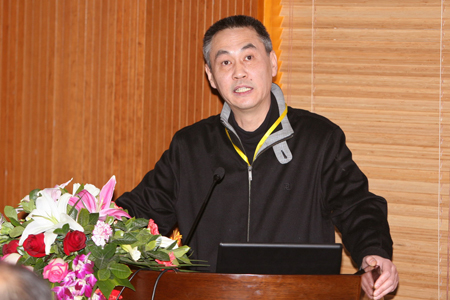Rule of law: Some nuances
By Pan Wei | Ecns.cn | Updated: 2022-01-14 11:40

"Rule of law" in Chinese (法治 fazhi) does not mean the same as in English. This paper compares three kinds of nuances: different definitions of law, different relations between law and ethics, and different political implications.
Definitions: LAW and 法/fa
To clarify the different definitions, this article start with following conclusion: the concept of "law" in China is much less authoritative than that in the West, because law in China is neither "divine" nor "natural."
In traditional Europe, the term "law" has a connotation of "divine" and/or "natural." Yet the Chinese character "法, fa" means regulative methods to solve current problems. "Fa" often combines with another character to form a phrase "办法, banfa", which means an approach to deal with a trouble. In short, "fa" is a pragmatic solution, albeit regulating.
In the modern West, people's representatives make laws, which replaces at large the righteousness of the God or natural law with the rights of the common people. Yet the "upper level" LAW still suggests a kind of absolutist and/or unconditional righteousness.
However, Chinese continue to support that the governing body make and enforce laws. Due to the tradition of blurred and unstable social cleavages, the Chinese government is supposed to be "neutral" among social strata, not representative to any one of them. The traditional Chinese legal system belonged to neither the British Common Law System, nor the European Continental (written) Law System. The Chinese Legal System differed mainly in that the executive hierarchy played the role of judges. Until now, Stakeholders still often fight court decisions with the appeal to the Party/Government, considering the executive branch more "neutral" than the judicial system.
Moreover, social solidarity in the kinship of "big family" has been a mainstream social value for more than two thousand years. Class struggle becomes an infamous concept particularly after the "Great Proletarian Cultural Revolution." The social criticisms target on government body instead of laws, on whether the government is neutral/fair or selfish/corrupt.
Chinese tend to understand laws as the commercial contracts that must observe in a commercial society. Other than commercial area, laws would be more or less a matter of convenience. Therefore, the authority of laws is subject to the severity of law enforcement.
Between Law and Ethics
This part start with following conclusion: while Western nations tend to combine morality with law-abiding citizenship, Chinese tend to separate law and morality. In China, family ethics are permanent, while laws are pragmatic and inconstant solutions to ever changing problems. The central issue in China is the people's wellbeing.
Laws in the West were rooted in major moral principles due to the long tradition of religious belief, particularly monotheist religion. Thus, being a moral person is to abide by law, by the laws of the Bible, for instance. In the West, therefore, law making is much more important than in China; and law enforcement is much easier than in China.
Chinese have become quite secular in very early time, no later than the Confucius time of two and half millenniums ago. The Chinese ethics derive mainly from the family ethics, defining the order of the family and that of a larger family. Extending the family order to political order builds the government's moral construct. Therefore, "nation" in Chinese is "国家, guojia", which literally means "a family country" or "a country of families."
Confucianism displays principles of family ethics. The family ethics, however, is incompatible with the civil and criminal laws. Thus its counterpart "legalist school" (法家, fajia) was born at the same time of Confucianism and dominated through the "Waring States" (BC 475-BC221) time until about the start of AD. The confrontation and compromise of the two schools of thoughts have continued until this day. The modern version of contradiction is that, the Chinese leaders talk in turns about "rule by law" one day, and "rule by moral principles" the other day.
For Chinese, family ethics are permanent, while laws are changeable and pragmatic approaches for solving problems. Chinese tend to follow laws at convenience unless it is harshly enforced. A "good" Chinese citizen might not be strictly a law-abiding one, but one very loyal to family ethics. For the West, ethics and the law are the same, and all the men-made laws need to follow the LAW, the upper-level law. Therefore, people in the West have a tradition of respecting the authority of law.
The incongruity between the law and the Chinese ethics appears "alien" to the West. On one hand, this clarification should help in understanding the relatively less importance of law making and the more importance of law enforcement in China. On the other hand, the Western nations also need to settle the contradictions between the men-made law and the "natural law", namely, the need for a supreme court or a constitutional court. This is to say, we should avoid exaggerating our difference.
Political applications of "rule of law"
As a practical "method" in China, law is not a critical concept in politics as that in the West. In the West, "rule of law" means the utmost importance of law above any ruling person. Rule of law is thus a denial to the personal rule, and a support to the principle of "all men are created equal."
However, the Chinese sage Mencius(BC385—BC289)had a famous saying: "Acts of kindness are not enough to govern, and laws do not practice by themselves" (徒善不足以为政,徒法不足以自行). Laws cannot rule by itself; persons make and enforce laws. Therefore, the Chinese understanding to this day has been that the governance everywhere is "rule by law" instead of "rule of law." This Chinese understanding is more appropriate in the time of people's law-making power, time of democracy, so to speak.
The dominance of the Chinese Communist Party in the legislature is obvious. That raises the doubt about "rule of the Party" or rule by law, rule of law.
The Chinese legislature, the single chamber "People's Congress," makes the law. The executive branches propose most of the legal bills, as in Japan and Korea. However, the Chinese legislature requires two preconditions to pass bills: one is widely consulting stakeholders, another is referring to the similar laws in the US, Japan, and European nations. Representatives will not vote for the bill until a consensus obtained. The formal Congressional meetings for vote in public is mainly to show national solidarity, which is vital for a huge nation as such.
The Chinese legal language is as difficult and vague as that in the U.S. National laws are more principles than details, allowing malleability/flexibilities for local law enforcement according to local conditions. That appears "federalism with Chinese characteristics."
In fact, the Chinese laws are as "normal" and "professional" as anywhere; and the Party mainly concerns political direction, namely, the solidarity and progress of the nation.
What is the relationship between the Party and the law? The avowed governing principle of China is an "organic whole" of three parts, which is taught by constitution-teaching textbooks of all school levels.
The three parts include the Party's leadership, the people as the master of the country and rule by law. Also considering the pervasiveness of the market mechanism, the three-part "organic whole" appear comparable to "liberal democracy" or "social democracy," despite the different emphasis on the unity of the huge nation. This principle of "organic three" does not mean to allow the Party to stand above the law, nor does it reject the equality among the people.
To conclude, the Chinese are quite familiar with the Western emphasis on the political rights of individuals and on the political freedom of socially stratified interest groups. Should Chinese be eager to buy that emphasis? It has been a question of faith or a missionary's mission.
The author is a professor at School of International Studies in Peking University.
























